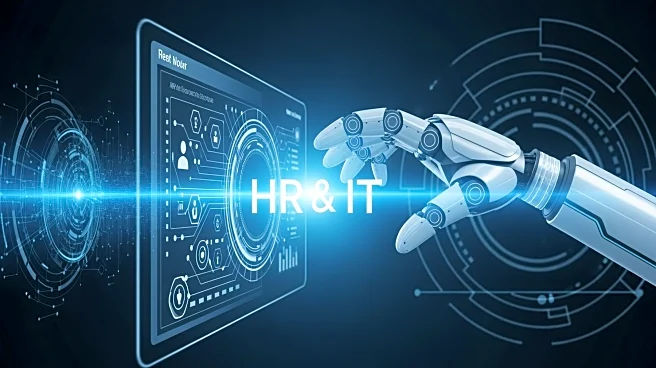What's Happening?
At the Human Resources Policy Institute Fall Summit, Jacqui Canney from ServiceNow and Tracey Franklin from Moderna shared insights on integrating HR and IT to leverage AI for organizational transformation.
Canney, ServiceNow's Chief People and AI Enablement Officer, emphasized the importance of AI in reshaping human capital management, while Franklin, Moderna's Chief People and Digital Technology Officer, discussed the rapid scaling of Moderna during the pandemic and the subsequent integration of technology into HR processes. Both leaders highlighted the need for strong governance, cultural alignment, and the evolving role of HR business partners in the AI-driven landscape.
Why It's Important?
The integration of HR and IT is crucial as organizations increasingly rely on AI to enhance efficiency and drive growth. ServiceNow and Moderna's experiences underscore the potential for AI to transform HR functions, making them more strategic and impactful. This shift is significant for U.S. industries as it can lead to improved workforce management, better alignment of technology with business goals, and enhanced employee engagement. Companies that successfully integrate AI into their HR processes may gain a competitive edge, while those that lag may face challenges in adapting to the rapidly changing technological landscape.
What's Next?
Both ServiceNow and Moderna plan to continue expanding their AI initiatives, with a focus on governance and cultural integration. ServiceNow aims to further develop its 'AI in HR' model, while Moderna is looking to sustain its growth post-pandemic by embedding technology deeper into its operations. These efforts may prompt other companies to explore similar integrations, potentially leading to widespread adoption of AI in HR across various sectors. The evolving role of HR business partners will likely require new skills and technological fluency, driving further changes in HR practices.
Beyond the Headlines
The integration of AI into HR processes raises ethical considerations, particularly around data privacy and the impact on employee roles. As AI tools become more prevalent, organizations must ensure that they are used responsibly and transparently. Additionally, the cultural shift required to embrace AI may challenge traditional HR practices, necessitating a reevaluation of organizational values and employee engagement strategies. Long-term, this transformation could redefine the relationship between technology and human resources, leading to new models of workforce management.








